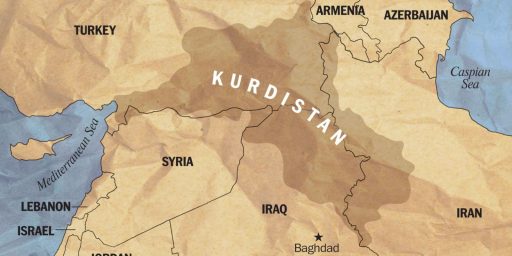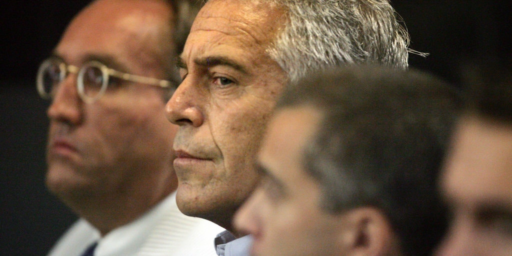At Least 53 Dead in Suicide Bombing Attacks in Iraq
Via the BBC: Iraq suicide blasts cause carnage
Suicide bombers have killed at least 53 people and wounded about 240 in attacks on crowds in the Iraqi capital Baghdad and the northern city of Kirkuk.
Three blasts in Baghdad killed at least 28 Shia Muslim pilgrims heading for the city’s Kadhimiya shrine.
[…]
In Kirkuk, a suicide bomber targeted a crowd of Kurdish protesters, killing at least 25 and injuring at least 150.
Thankfully these types of attacks are far less common than they were just recently. The question occurs, of course, as to whether this represents an anomaly in post-surge Iraq or a sign that the peace is a tenuous one.
The strike in Kirkuk is especially of interest, given that the long-term status of the city is far from settled and one wonders what role violence will place in determining its ultimate status. Specifically Kirkuk is linked to major oil reserves and is disputed amongst the Kurds, Turkomen and the Arabs.





The Kurds are pretty determined to never face another mass killing like they did in the 80’s. While they have been our best ally, I find it hard to believe they will ever willingly give up their militia. I think its still possible they may make a push for independence.
Steve
I suspect that it indicates that putting an extra 30,000 troops in the country can help hold down attacks- until you pull them back out.
Now that the surge is officially over I’d be very surprised if we didn’t see the numbers start drifting upwards again. Maybe not to 2005 levels (particularly if Sadr’s truce continues) but higher nonetheless.
I think it’s rather more likely that these are attacks of opportunity (the religious festival; a political demonstration) and those will be endemic in Iraq for the foreseeable future.
How’s that different than what we had before the surge? Seems like we had various attacks of opportunity (the Golden Mosque being the biggest example)which promoted an environment of chaos and reprisals.
Maybe I’m misunderstanding the distinction you are drawing.
Maybe I’m misunderstanding the distinction you are drawing.
It does seem like there’s an awful, awful lot of opportunity, doesn’t there? And it’s kind of weird to hear someone say that these attacks are going to be endemic to Iraq for the foreseeable future.
Bizarre. Still, the surge worked, right?
Something for the Dems to cheer about.
There was a bombing in China and in India during the previous week. Do those represent a failure of the surge? A crazy guy walked into a church last Sunday and shot up the place, killing a couple of people. Do these always mean a policy failure or just a homicidial act?
BTW, I would expect we will see these type of attacks become more frequent in the 8 weeks prior to US elections.
Moron.
Always resort to name calling when you can’t refute the truth.